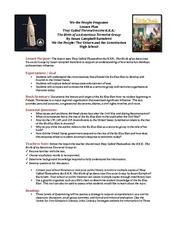Center for Instruction, Technology, & Innovation
Did African American Lives Improve After Slavery?
The Civil War made slavery illegal, but all ex-slaves were not totally free. Scholars visit eight different classroom stations to uncover life during the Reconstruction Era in America. Groups discover items such as Black Codes, 13th,...
School Improvement in Maryland
Supreme Court Case Overview I
As part of a study of the 14th Amendment to the United States Constitution, class members examine four Supreme Court decisions—Gitlow v. New York, Mapp v. Ohio, Gideon v. Wainwright, and Griswold v. Connecticut—that incorporated the due...
Library of Congress
The Emancipation Proclamation and the Thirteenth Amendment
How did the Emancipation Proclamation lead to the Thirteenth Amendment? Middle schoolers analyze primary source documents including the text of the Emancipation Proclamation, political cartoons, photographs, and prints to understand the...
C3 Teachers
African American Voices and Reconstruction: What Does It Take To Secure Equality?
High schoolers research the 13th, 14th, and 15th Amendments, as well as other primary source documents, to determine Reconstruction's impact on the North and South. The 34-page inquiry-based lesson includes a staging question and...
Pacific University Oregon
Civil Rights: US History
To gain an understanding of the Civil Rights Movement of the 1960s, class members investigate the Jim Crow Laws, the Emancipation Proclamation, the 13th, 14th, and 15th Amendments of the US Constitution, and the 1898 Supreme Court case,...
Southern Poverty Law Center
Teaching Hard History: A Framework for Teaching American Slavery
Pupils investigate American slavery from colonial times through the Civil War. They incorporate primary sources, video clips, and firsthand accounts to understand how the slavery issue gripped the nation. Essays, presentations, and...
Curated OER
The Called Themselves the K.K.K.; The Birth of an American Terrorist Group
How did Ku Klux Klan develop and flourish in the US? How did the government respond to acts of terrorism conducted by the KKK following the Civil War? How does the government respond to acts of terrorism today? This resource launches a...
State Bar of Texas
Dred Scott v. Sandford
Who decides someone is not a real person? Scholars investigate the Dred Scott v. Sandford court case which deals directly with slavery and citizenship. After viewing a short video clip, classmates work in pairs to assess and discuss the...
Middle Tennessee State University
Fights, Freedom, and Fraud: Voting Rights in the Reconstruction Era
As part of a study of post Civil War era, young historians investigate the changes in voting rights during the Reconstruction Era (1863-1876), the fraud involved in the Hayes-Tilden presidential election of 1876, and efforts by Pap...
Center for History and New Media
A Look at Virginians During Reconstruction, 1865-1877
The transition between rebellion to reunification was not smooth after the Civil War. Young historians compare primary and secondary source documents in a study of the Reconstruction era in Virginia, noting the rights that were not...











